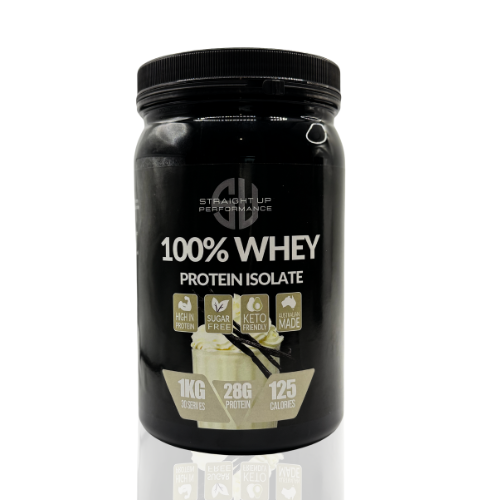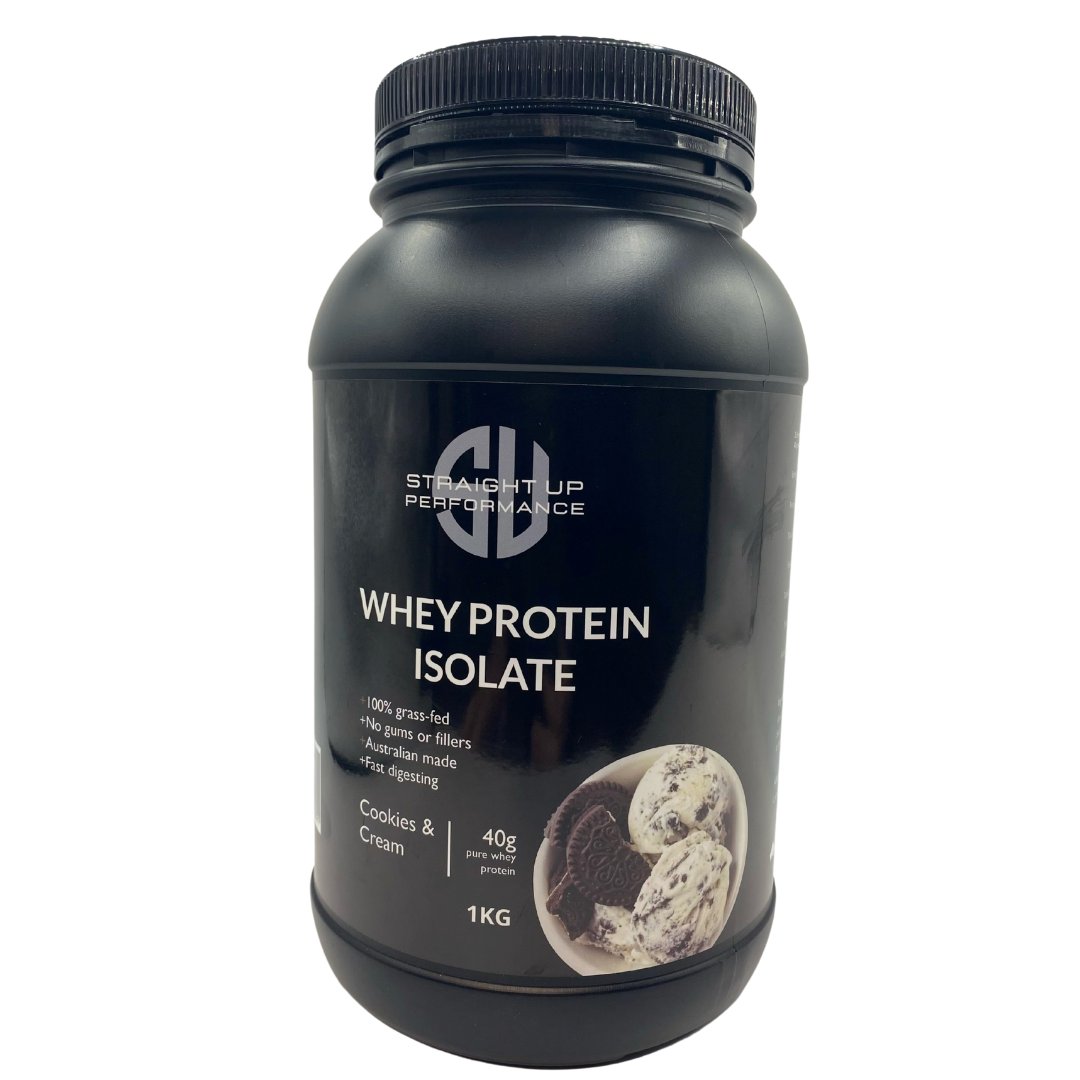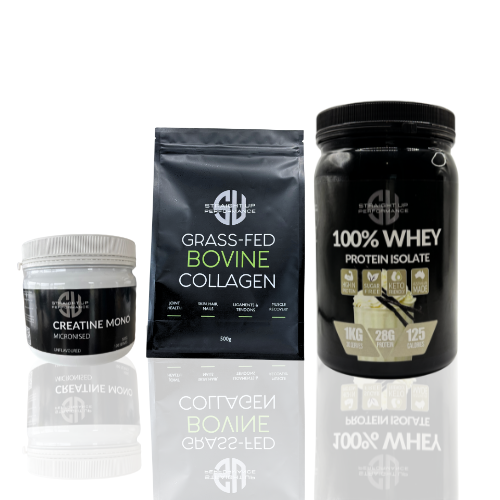When was the last time you set ambitious goals: eat more protein, take supplements consistently, hydrate properly, prep meals every Sunday. The motivation is there. The intention is genuine. And yet, three weeks later, you're back to old patterns?
Sound familiar?
The truth is: motivation gets you started, but habits keep you going. Understanding the psychology behind habit formation isn't just interesting—it's the difference between fleeting New Year's resolutions and lasting behavioural change that actually improves your performance.
The Science of Habit Formation: More Complex Than You Think
Within psychology, habits are defined as processes: when a specific cue in your environment triggers an automatic response, without you consciously deciding to do it, you've formed a habit.
Here's what makes habits powerful:
- They require minimal cognitive effort
- They operate with little conscious awareness
- They happen with minimal intention or control
- They free up mental energy for other decisions
Think about your morning routine. You probably don't actively decide every step of making your coffee or brushing your teeth—you just do it on autopilot. That's habit at work.
The question is: how do we harness this automatic behaviour system for healthy choices?
The Two Phases of Habit Formation: Why Most People Quit
Transforming sporadic behaviour into a consistent routine unfolds in two distinct phases—and most people fail because they don't understand the difference.
Phase 1: Initiation (Driven by External Motivation)
This is where most of us live. Studies show that more than 60% of people who start an exercise program do so for aesthetic reasons: to lose weight, look good, or shape up. In nutrition, people start eating "healthy" to see specific outcomes—drop a weight class, improve body composition, or fix a health marker.
The problem? External motivators are notoriously unreliable. When results don't come fast enough, or when life gets stressful, these extrinsic rewards lose their power. Even if you achieve that external goal, it's usually not enough to make the behaviour automatic.
Phase 2: Execution (Driven by Intrinsic Rewards)
Here's where maintainers live—people who've been consistently exercising or eating well for more than three months. Research shows these individuals continue because it feels good mentally. The behaviour itself has become rewarding.
The shift: From "I should do this" to "I prefer doing this."
The challenge: Getting from Phase 1 to Phase 2 requires a strategic approach that most people never learn.
The Habit Loop: Understanding What Makes Habits Stick
Habits operate as a four-part loop. Understanding these components gives you leverage to build better habits (or break bad ones):
1. The Cue (Trigger)
Something in your environment signals it's time to act. This could be:
- Time of day (6am alarm = pre-workout shake)
- Location (kitchen counter = take supplements)
- Emotional state (stress = reach for protein snack, not junk food)
- Preceding action (finish training = consume recovery nutrition)
- Presence of specific people or objects
The key: Cues must be consistent and obvious. Inconsistent cues create inconsistent habits.
2. The Routine (The Behaviour Itself)
This is the actual action you want to automate. For nutrition habits, this might be:
- Making a protein shake
- Taking your daily creatine
- Prepping meals on Sunday
- Drinking water first thing in the morning
3. The Reward (What Your Brain Gets)
This is where most people get it wrong. The reward needs to be immediate and intrinsic for the habit to stick.
Weak reward: "I'll look better eventually" Strong reward: "I feel more energised" or "I like the ritual"
Research on intrinsic rewards and exercise habits shows that maintainers continue because the behaviour itself becomes rewarding, not because of external outcomes.
4. The Belief/Craving
You must genuinely believe the routine leads to the reward, and eventually, you'll crave the reward enough that the cue automatically triggers the behaviour.
The Research That Changes Everything: Context Beats Willpower
Here's perhaps the most important finding from habit research: habits persist if the same cues are present in the environment. This means behaviours can change dramatically when you're removed from problematic environments, and habits may be more quickly reconditioned in different settings.
Practical application:
- Struggling to eat breakfast? Change your morning environment—set up your kitchen the night before with everything visible and ready
- Can't remember to take supplements? Put them next to your coffee maker (cue: making coffee → routine: take supplements)
- Skip post-workout nutrition? Keep a pre-made shake in your gym bag (cue: finish training → routine: immediate access to nutrition)
The power of environmental design cannot be overstated. You're not lacking willpower—you're lacking well-designed cues.
Why "Just Do It for 21 Days" Is Terrible Advice
You've probably heard that it takes 21 days to form a habit. This is a myth, and it's setting you up for failure.
Research on habit formation interventions shows significant variability in how long it takes different people to form different habits. Some habits automate quickly (taking a supplement with morning coffee might become automatic in 2-3 weeks), while others take months (consistent meal prep every Sunday might take 10-12 weeks to feel automatic).
Factors that influence habit formation speed:
- Complexity of the behaviour (simple habits form faster)
- Consistency of cues (same time, same place speeds formation)
- Immediate reward quality (better rewards = faster formation)
- Baseline self-regulation capacity
- Environmental stability
Why Feeling Good Matters More Than You Think
The hedonistic principle: We repeat behaviours that make us feel good and avoid behaviours that make us feel bad. Simple, but profound.
For nutrition habits, this means:
- If your protein shake tastes terrible, you won't sustain it
- If meal prep feels like punishment, it won't become automatic
- If taking supplements is complicated and annoying, you'll skip it
The solution: Design habits that are inherently rewarding:
- Find protein sources you genuinely enjoy
- Make meal prep social (do it with a partner or friend)
- Use a supplement shaker you actually like
- Create a morning supplement ritual that feels good (make it part of a pleasant morning routine)
Studies show that positive affect following behaviour enhances automaticity over time. Make healthy behaviuors as pleasant as possible, and they're more likely to stick.
The Instigation vs. Execution Distinction
Research differentiates between two types of habits, and understanding this distinction is crucial:
Instigation Habit: The automatic urge to start the behaviour
- Example: 6am alarm goes off → immediately think "protein shake time"
- This is the direct activation of action
Execution Habit: The automatic way you perform the behaviour once started
- Example: The specific steps you take to make your protein shake
Current research suggests building an instigation habit is more valuable for behaviour maintenance than an execution habit. In other words, focus first on making the initiation automatic, and worry less about perfecting every detail of execution.
For nutrition: Prioritise consistency of when and where you eat/supplement over perfect macros or timing. Once the instigation is automatic, you can optimise execution.
Building Nutrition Habits That Last: The Evidence-Based Protocol
Based on the research, here's your science-backed strategy for forming lasting nutrition habits:
Step 1: Choose ONE Specific Behaviour
Not: "Eat healthier" Instead: "Consume 40g protein within 2 hours of training"
Specificity is non-negotiable. Vague goals don't create clear cues or routines.
Step 2: Design an Obvious, Consistent Cue
Ask yourself:
- When exactly will I do this?
- Where exactly will I do this?
- What will trigger this behaviour?
Example: "After I finish training (cue), I will drink the protein shake from my gym bag (routine)"
Step 3: Make the Behaviour as Easy as Possible Initially
Start smaller than you think necessary. Research shows that simpler behaviours automate faster.
Not: "Prep all meals for the week every Sunday" Start with: "Prep protein sources for three dinners on Sunday"
Once the simpler version becomes automatic, you can expand.
Step 4: Attach an Immediate Intrinsic Reward
Find something genuinely rewarding about the behaviour itself:
- The taste of your post-workout shake
- The satisfaction of checking off your habit tracker
- The feeling of being "done" with meal prep
- The mental clarity from proper nutrition
The reward must be immediate, not "I'll look better in 3 months."
Step 5: Protect Environmental Consistency
Keep cues constant:
- Same time each day
- Same location when possible
- Same preceding action
Disruptions happen, but returning to the same environmental cues helps re-establish the habit quickly.
Step 6: Track Automaticity, Not Just Compliance
Don't just ask: "Did I do it?" Also ask: "Did it feel automatic, or did I have to force myself?"
When a behaviour starts feeling like "what I just do" rather than "what I should do," you've formed a habit.
The Bidirectional Relationship: Behaviour Builds Habits, Habits Drive Behaviour
Doing the behaviour strengthens the habit, and strong habits make the behaviour more likely.
This creates a positive feedback loop:
- You consciously perform the behaviour (effortful)
- Repetition strengthens the context-action association
- The behaviour becomes more automatic (less effortful)
- The habit cue now triggers the behaviour with minimal conscious decision
- You perform the behaviour more consistently
- The habit strengthens further
The implication: The hardest part is the first 4-6 weeks when everything still requires conscious effort. Push through this phase, and the behaviour gets progressively easier.
Don't expect it to feel easy immediately. Habit formation is a gradual process of transferring from conscious control to automatic processes.
When Habits Fail: Common Mistakes and How to Avoid Them
Even with the best intentions, habit formation often fails. Here's what the research tells us about why:
Mistake #1: Relying on Motivation Alone
The problem: Motivation fluctuates daily The solution: Build systems that work even when motivation is low
Mistake #2: Too Many Habits at Once
The problem: Each new habit requires cognitive resources The solution: Focus on one habit at a time until it's automatic (typically 6-12 weeks)
Mistake #3: Inconsistent Cues
The problem: "I'll take my supplements when I remember" The solution: Attach to a specific, daily cue ("I take supplements when I pour my morning coffee")
Mistake #4: No Immediate Reward
The problem: All rewards are long-term ("I'll be healthier eventually") The solution: Find something immediately rewarding about the behaviour
Mistake #5: Too Complex Initially
The problem: "I'm going to meal prep everything perfectly" The solution: Start embarrassingly small and build from there
Mistake #6: Giving Up After Missing Once
The problem: All-or-nothing thinking destroys habit formation The solution: Missing once doesn't break a habit—missing twice starts a new pattern. Get back on track immediately.
Nutrition Habits Worth Building: Where to Start
Based on research showing habit formation interventions are effective for health behaviours, here are the nutrition habits most worth your effort:
Habit 1: Consistent Protein Intake
- Cue: Each main meal
- Routine: 30-40g protein per meal
- Reward: Satiety and energy stability
Habit 2: Daily Creatine
- Cue: Morning coffee/breakfast
- Routine: 5g creatine mixed with water
- Reward: Simple routine completed, cognitive benefits over time
Habit 3: Hydration Upon Waking
- Cue: Alarm/getting out of bed
- Routine: 500ml water before anything else
- Reward: Immediate refreshment, kickstarts metabolism
Habit 4: Post-Training Nutrition Window
- Cue: Finish training session
- Routine: Consume prepared shake/meal within 2 hours
- Reward: Recovery sensation, routine completion
Habit 5: Weekly Meal Preparation
- Cue: Sunday morning after breakfast
- Routine: Prep protein sources for 3-5 meals
- Routine: Satisfaction of being "ahead" for the week
Start with ONE. Once it's automatic (feels easy, you do it without thinking about it), add the next.
The goal isn't perfection—it's automation. You're not trying to white-knuckle your way through discipline forever. You're trying to make healthy behaviours so automatic that NOT doing them feels weird.
That's when you've truly changed.








